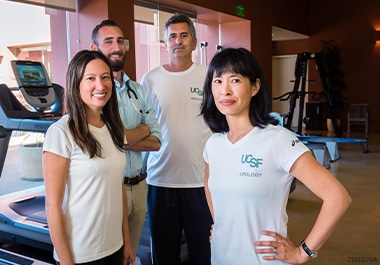June M. Chan on Surviving Prostate Cancer: Get Up and Move
June MayLin Chan, ScD, has some scientific advice for men who have prostate cancer and want to improve their chances of avoiding progression of the disease and living longer: get off the couch and move.
“First I would say, stand up,” she says. “If you’re watching TV, decide that whenever a commercial comes up, you’re going to stand up. Just go walk outside for a moment, or walk up and down your street once, and then come back.”
“If someone is very sedentary, the key is, don’t be sedentary,” she adds.

Chan is a professor and vice chair (education) of the Department of Epidemiology and Biostatistics at University of California San Francisco. She received two grants from AACR early in her career: the AACR-AFLAC Young Investigator Scholars in Cancer Research Award in 2000 and the AACR-California Department of Health Services Career Development Award in Gender-Related Cancer Research (prostate) in 2002.
For the past 20 years, she has studied the ways diet and exercise, among other factors, contribute to cancer progression, particularly in prostate cancer.
“There are many different ways that exercise can improve one’s survivorship or trajectory with prostate cancer,” she says. “Specifically, we think exercise has anti-angiogenic and anti-inflammatory effects, reduces oxidative stress, and reduces what one would think of as psychological stress, which then also has downstream beneficial effects. So there are lots of different ways that exercise can improve cancer survivorship.”
Using the Health Professionals Follow-Up Study of more than 50,000 men, Chan and Stacey Kenfield, ScD, with others, reported in 2011 that in approximately 2,700 men with prostate cancer, physical activity after diagnosis was associated with lower overall mortality and prostate cancer-specific mortality. In a concurrent study led by Erin Van Blarigan (with Chan and Kenfield) and conducted within CaPSURE (Cancer of the Prostate Urologic Research Endeavor), a complementary finding was observed that brisk walking pace was associated with a reduced risk of prostate cancer progression, among men diagnosed with localized prostate cancer.
“A modest amount of vigorous activity such as biking, tennis, jogging, or swimming for 3 or more hours a week may substantially improve prostate-cancer specific survival,” they wrote. (1) A steady stream of papers has strengthened the case about the benefits of exercise and nutrition for those living with cancer.
The team was gratified when the U.S. Department of Health and Human Services adopted the same view in its “Physical Activity Guidelines for Americans” in 2018.
“Cancer survivors should engage in regular physical activity for its many health benefits,” the HHS guidelines said. “For adults with breast, colorectal, or prostate cancer, greater amounts of physical activity after diagnosis help to substantially lower the risk of dying from their cancer.”
That was music to Chan’s ears.
“For us in the field, having worked with this for about 10 years at that time, this felt like a great accomplishment, to go from the first paper to seeing it listed in a public health guideline specifically for men with prostate cancer,” she said. “It felt like we did something.”

Chan also has a keen interest in diet and nutrition and their role in prostate cancer progression and mortality. As an undergraduate at Harvard College, she interned for the renowned Walter Willett, MD, DrPH, professor at the Harvard T.H. Chan School of Public Health and founder of several large-scale cohort studies of nutrition and health. She worked closely with Eric Rimm, ScD, and Meir Stampfer, MD, DrPH, to use the studies in her research.
“That opened my eyes to the whole field of epidemiology and public health,” Chan said. After a Fulbright scholarship in cancer epidemiology in Sweden, she returned to Harvard to pursue a doctorate in science. She focused on nutritional and hormonal risk factors in prostate cancer.
“The theme of my research has been to look at modifiable risk factors that improve cancer survivorship, and then specifically in prostate cancer,” she said.
With her early-career grants, Chan established a cohort of approximately 900 men with early-stage prostate cancer who donated blood or biospecimens for research at diagnosis. Her team then followed these men to record their secondary clinical outcomes. By establishing this cohort, they aimed to develop a resource for examining various biomarkers for prostate cancer progression.
Their initial analyses of risk factors for prostate cancer progression focused on an antioxidant-gene pathway that was strongly predictive of advanced or fatal prostate cancer in another cohort and in a randomized clinical trial. The cohort served as a valuable resource for studies on other risk factors for prostate cancer progression.
The study funded by the AACR-California Department of Health Services led to the development of NCI RO1 and DOD grant applications to expand and continue the cohort.
Cohort studies go on for years. The grants from AACR not only allowed her to continue her work and apply for other funding, but also confirmed her selection of a research area, early in her career.
“When you are just starting out as a researcher, awards like that validate that you’re on to something that seems of scientific importance to other more experienced professionals in the field,” she said. “That’s probably the most important thing to keep you engaged in the topic.”
Several large, national population studies of health professionals, physicians, and men diagnosed with localized prostate cancer allowed her to tease out several factors involving physical exercise and diet that may help deter progression of prostate cancer after diagnosis. Much of this is summarized in the “Prostate Eight” study, led by Dr. Kenfield, which recommends, in a nutshell:
- Three or more hours a week of vigorous aerobic exercise.
- Replace solid fats with vegetable oils and consume one serving per day of oil-based salad dressing or nuts.
- One serving per day of cruciferous vegetables.
- Two or more servings per week of cooked tomatoes or tomato products.
- Two or more servings a week of fish.
- Avoid all processed meat.
- No single vitamin or mineral supplements unless doctor recommends.
- No tobacco.
Chan also sees survivorship studies as a window on cancer initiation and prevention as well.
“Survivorship is one model of asking bigger questions about the impact of things like diet and exercise in cancer generally,” she said. “If you step back a little bit and consider the broader picture, diet and exercise probably play a role in cancer development and initiation to start with. So being able to tease apart the biological pathways of cancer progression has direct relevance to informing management strategies, prevention strategies, improvement of diagnostics and prognostication at the point of initial identification of cancer.”
“Those biological clues can be rewound backwards and still have direct, perhaps important scientific discovery relevance both for management, and also in prevention of cancer,” she said.
Chan and her team are gearing up for a study of diet, exercise, and cancer in underrepresented groups, which will go beyond prostate to include several different types of cancer. The study will be called “Eat, Move, Sleep.” Enrollment will open soon.
- Kenfield SA, Stampfer MJ, Giovannucci E, Chan JM. Physical activity and survival after prostate cancer diagnosis in the health professionals follow-up study. J Clin Oncol 2011;29(6):726-32. doi: 10.1200/JCO.2010.31.5226.